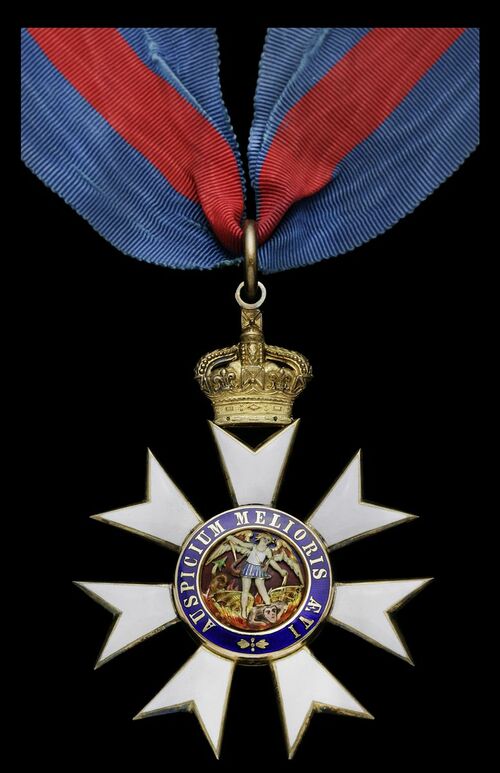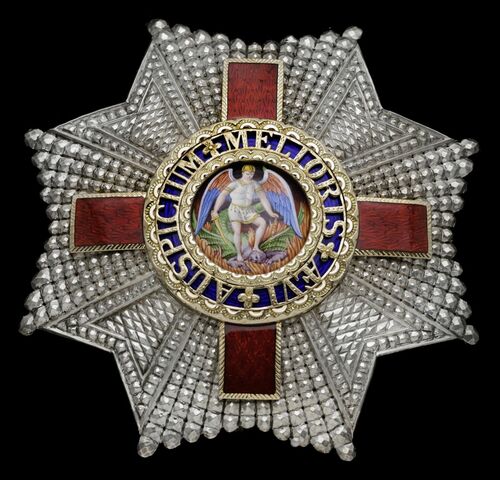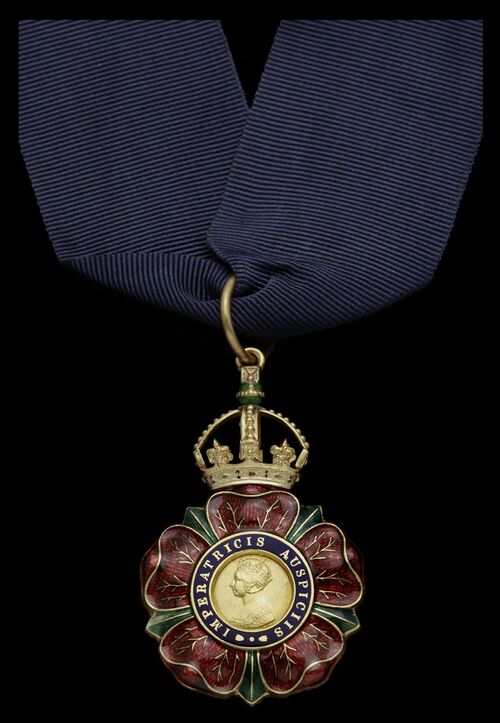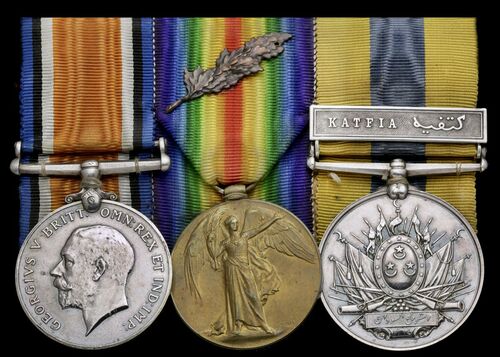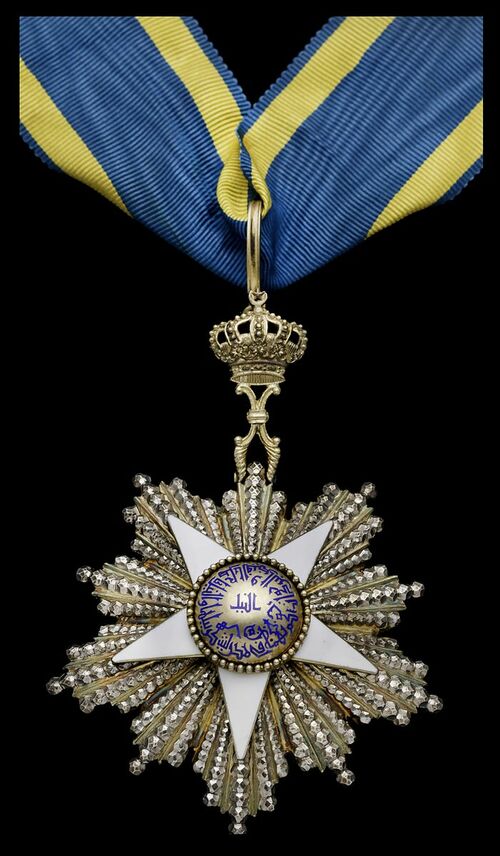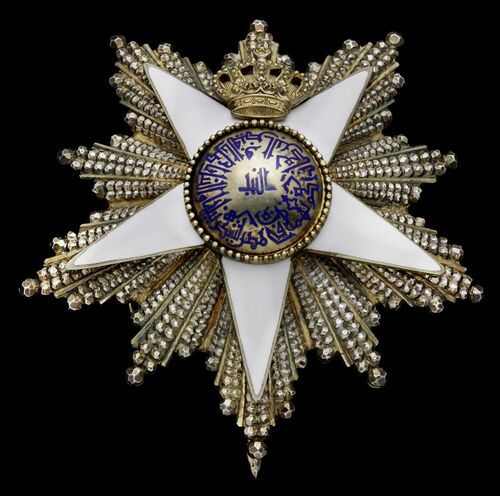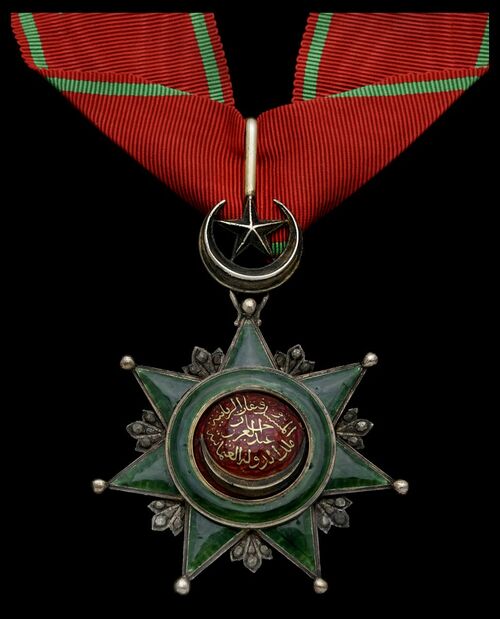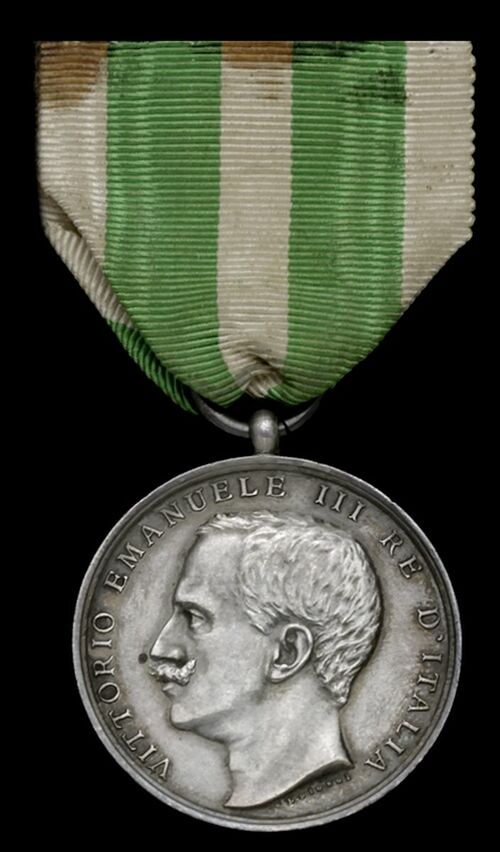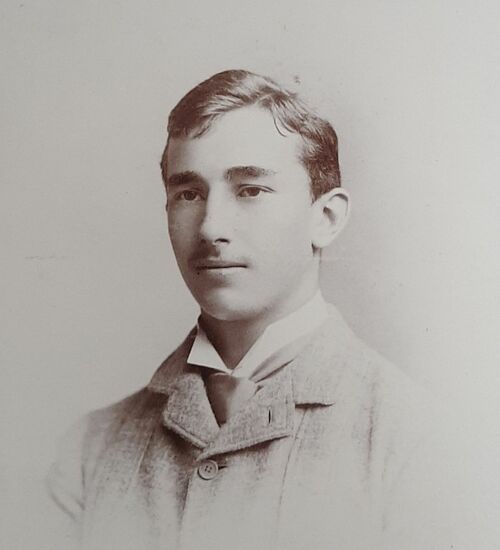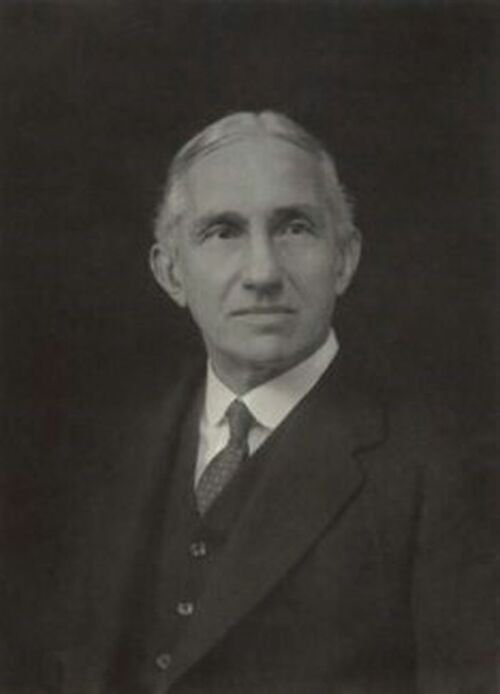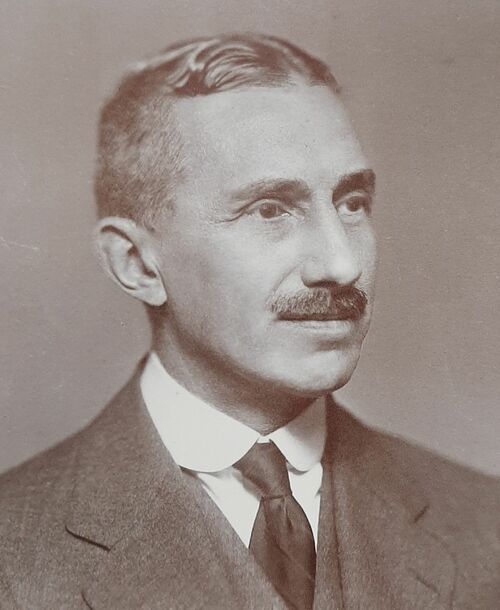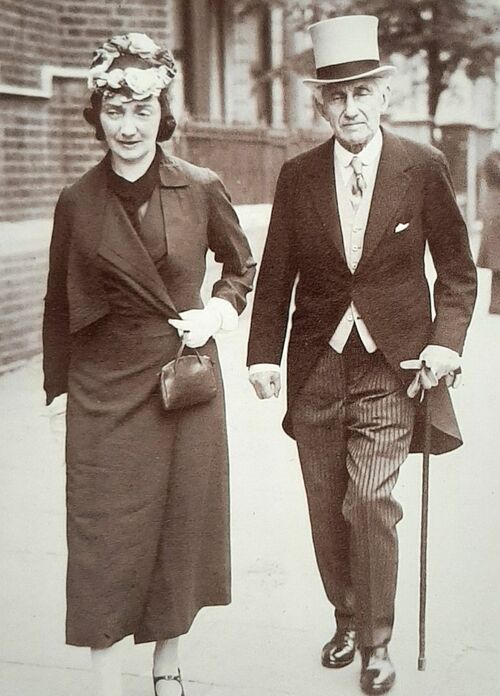Auction: 23001 - Orders, Decorations and Medals
Lot: 342
A rare and unusual K.C.M.G., C.I.E. group of ten awarded to Sir Edgar Bonham-Carter, who drafted the legal framework for the Sudan at the behest of Lord Cromer, was called 'father and founder of the legal system' in post-War Iraq
In a remarkable career he was also wounded in the Katfia affair, a conflict in which he joined without military rank; besides this he was capped as an England Rugby International and is the Great Uncle of actress Helena Bonham-Carter
The Most Distinguished Order of St. Michael and St. George, Knight Commander’s (K.C.M.G.) set of Insignia, comprising neck Badge, silver-gilt and enamel; breast Star, silver, silver-gilt and enamel, with gold pin; The Most Eminent Order of the Indian Empire, Companions (C.I.E.) 3rd Type neck Badge, gold and enamel; British War and Victory Medals, with M.I.D. oak leaves (Sir E. Bonham Carter); Khedive’s Sudan 1896-1908, 1 clasp, Katfia, unnamed as issued; Egypt, Kingdom, Order of the Nile, 2nd Class set of Insignia, comprising neck Badge and breast star, silver, silver-gilt and enamel; Turkey, Ottoman Empire, Order of Osmania, 3rd Class neck Badge, silver, silver-gilt and enamel; Italy, Messina Medal 1908, silver, the campaign awards mounted court-style as worn, some enamel wear to Order of Osmania, otherwise overall good very fine (10)
Provenance:
Alan and Jane Woodliffe Collection, DNW, May 2011.
K.C.M.G. London Gazette 2 January 1920, as Senior Judicial Official in the Civil Administration of Mesopotamia.
C.M.G. London Gazette 25 June 1909, as Legal Secretary to the Soudan Government.
C.I.E. London Gazette 5 June 1919.
Order of the Nile, 2nd Class London Gazette 20 June 1916, as Legal Secretary, Sudan Government.
Order of Osmania, 3rd Class London Gazette 23 September 1902 as Legal Secretary, Sudan Civil Administration (Reorganising the Sudan’s Islamic Law Courts).
M.I.D. London Gazette 25 October 1916.
‘... to E. Bonham Carter, Esq., C.M.G.,Legal Secretary, I am indebted for much valuable advice on legal and other matters.’
M.I.D. London Gazette 18 February 1919.
Mesopotamian Expeditionary Force. ‘.... distinguished and gallant services and devotion to duty.’
M.I.D. London Gazette 27 May 1919.
‘..... finally, I cannot close this despatch without a reference to the loss the Sudan Government sustained in 1917 when Mr. E. Bonham Carter, C.M.G., decided to accept the post of Senior Judicial Officer in the new Administration in Mesopotamia. Mr. Bonham Carter's services are too well known to Your Excellency to require commendation from me, but I should like to take this opportunity of thanking him for his unfailing support and sympathy and most helpful advice, not only in matters concerning his own Department, but in all the problems which confronted the Government during an anxious and difficult time.’
Edgar Bonham-Carter was born in London on 2 April 1870, the fifth of the eleven sons of Sibella and Henry Bonham-Carter. His father was a barrister and managing director of the Guardian Assurance Company while his mother was daughter of George Warde Norman, a director of the Bank of England. Also a relative - although entering her final years - was Florence Nightingale, who reportedly took an interest in his early career. Other notable relatives include his brothers General Sir Charles Bonham-Carter and Sir Maurice Bonham-Carter, Principal Private Secretary to Herbert Asquith between 1910-1916.
Educated at Clifton College and later New College, Oxford, he obtained second-class honours in jurisprudence in 1892, and notably played rugby as a forward for Oxford University being capped once for England (England v Scotland at Richmond, 7th March 1891). He continued playing rugby after leaving university, joining Blackheath, before turning out for the Barbarians in 1892. Leaving University he read law in the chambers of Edward Beaumont at Lincoln's Inn and was called to the Bar in 1895.
Despite his relative youth Bonham-Carter soon came to the notice of a number of prominent men including Lord Cromer, the British Consul-General in Egypt. In 1899, after the conquest of the Sudan, Bonham-Carter was chosen by Lord Cromer - though still only twenty-nine - to devise and prepare a complete framework of civil and criminal law in Sudan, where no legal system yet existed. Appointed Judicial Adviser and later Legal Secretary as well as a Member of the Governor-General's Council, he was the only senior civilian member of an otherwise military administration. The success of this new system was remarkably quick and complete. Introducing a simplified version of the Indian penal and criminal procedure codes in the first year of his appointment; his alterations to the Indian law of murder and homicide was considered by most Sudan judges to be an improvement.
Again drawing on Indian Law in he drew up a code of civil procedure in 1900 mixing in English common law, Sudan statute, and local customary law - especially as it pertained to land. He later reorganised the Islamic Law Courts in 1902 and provided them with appropriate jurisdiction to operate. The structure he created was widely well received and proved so enduring that it outlasted Anglo-Egyptian rule in the Sudan and was still in use after independence. Bonham-Carter was not only able to create an effective legal code but also uphold it, giving advice to generations of magistrates and judges.
Notably while holding the appointment of Legal Secretary he was involved in the Katfia affair. Bohnham-Carter was touring the region when a Mahdist Veteran named Abd al-Qadir Muhammad Imam Wad Habuba raised a local revolt. Two Companies of infantry where despatched with the Governor of the Blue Nile, Ernest Arthur Dickinson, to lead them. For an unknown reason Bonham-Carter attached himself to this column, thereby placing himself in harm's way. This force retook Katfia without loss and held it against a rebel attack with 17 killed and wounded including Bonham Carter - wounded - and the revolt was crushed (Medal & clasp).
While his award of the Messina earthquake Medal is confirmed it is not known how precisely he was involved, though a connection is known with to Sir Ronald Rodd Ambassador to Italy at the time of the earthquake. Continuing to serve in the Sudan he was 'mentioned' in a dispatch from General Sir F. Wingate in 1916. The next year he was called upon to perform the same act of lawgiving in Iraq, taking up the appointment of Senior Judicial Officer in Baghdad. After completing this no less stunning piece of legal conjuration Bonham-Carter, he was appointed Judicial Advisor to the recently freed region of Mesopotamia in 1919.
This appointment differed from his previous efforts in that he had a basis of Ottoman law to work with. Rather than creating a framework he was instead to modernise and improve upon the system that already existed. With the goal of ensuring that the courts were staffed by qualified judges and efficiently staffed he established a school of law and set about drafting legislation himself. With the growth of nationalism and an increasingly unstable political landscape he was able to create an efficient and solid basis for a legal system which - like in the Sudan survived even beyond independence. Nuri Said - himself a delegate at the Versailles Treaty and future Prime Minister of Mandatory Iraq - said of Bonham-Carter that he was the father and founder of the legal system in Iraq.
While in the country he also befriended Gertrude Bell - who herself referred to him as 'wisest of men' - and it was from her that he developed a passion for archaeology. A legacy of £5000 Bell was used to set up the British School of Archaeology in Iraq of which Bonham-Carter became the Honorary Secretary. When the school was launched officially in 1932 on a firmer financial basis he was appointed the first chairman of the executive committee, a post he held until he died.
Leaving the Middle East in 1921, Bonham-Carter undertook a short political career between 1922-25 - standing as a Progressive Liberal member of the London County Council representing East Bethnal Green. Appointed a representative on the governing body of the School of Oriental and African Studies, he was regularly re-appointed until 1945, when he resigned. Chairman of the First Garden City Ltd. from 1929 he was heavily involved in the development of the first garden city of Letchworth.
Further appointments included a role with the Executive Committee of National Trust, Vice-Chairman of Executive Committee of Commons., Open Spaces & Footpaths Preservation Society and Chairman of National Housing & Town Planning Council. He was also President of North East Hampshire Agricultural Committee and a Member of the Town & Country Planning Association. This astonishing commitment to public works is all the greater when one realises that he was increasingly lame at the time. Marrying Charlotte Helen Ogilvy, daughter of Colonel William Lewis Kinloch Ogilvy, 60th Rifles, the couple had no issue and the proceeds of his estate were returned to the community; sold together with a file of copied research comprising, Gazette extracts, official correspondence, photographs and newspaper articles as well as obituaries, M.I.D. certificates and a certificate of award for the Messina Earthquake medal along with a note of the contents of the Bonham-Carter Family papers which relate to the recipient.
Subject to 20% VAT on Buyer’s Premium. For more information please view Terms and Conditions for Buyers.
Sold for
£5,500
Starting price
£1700

